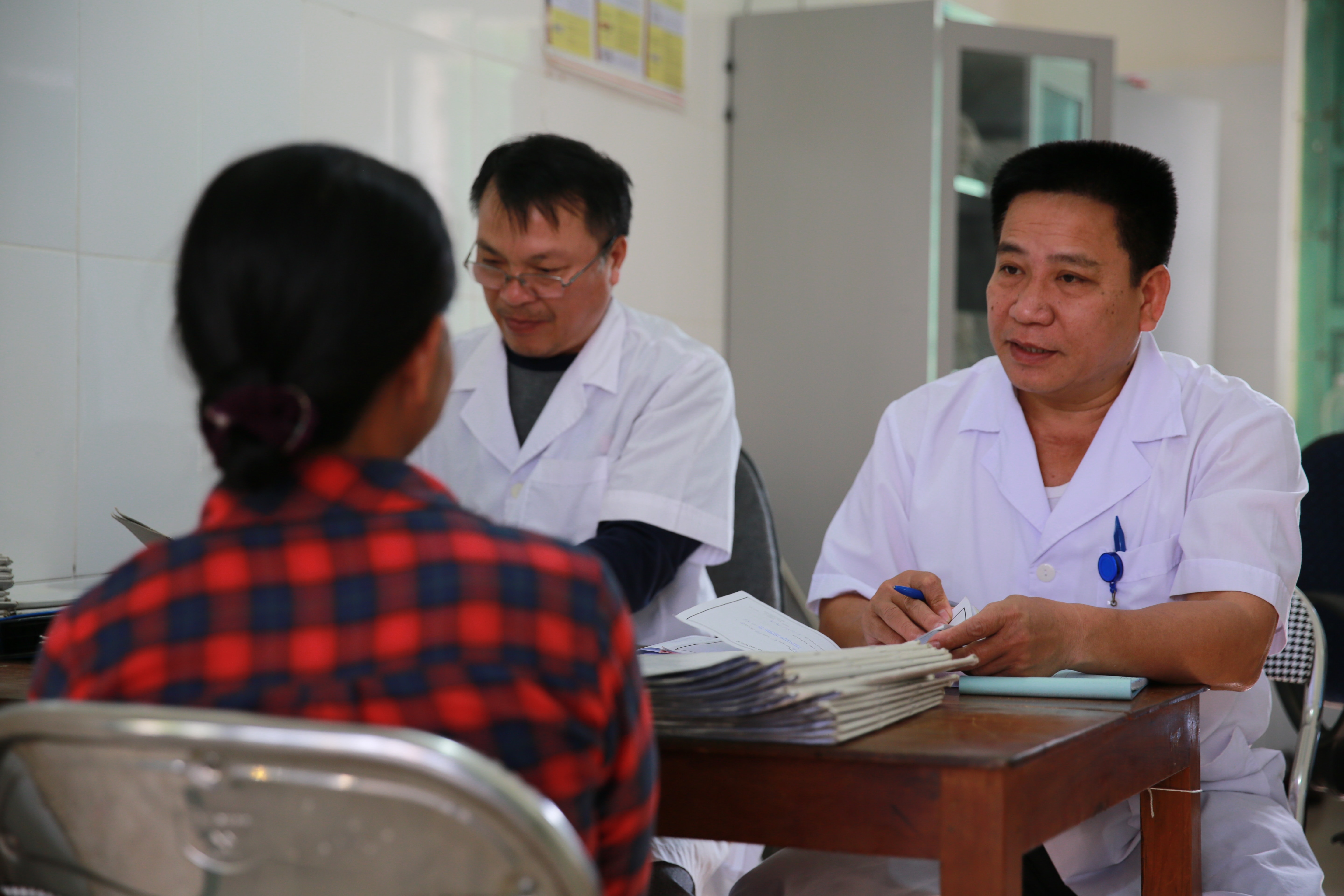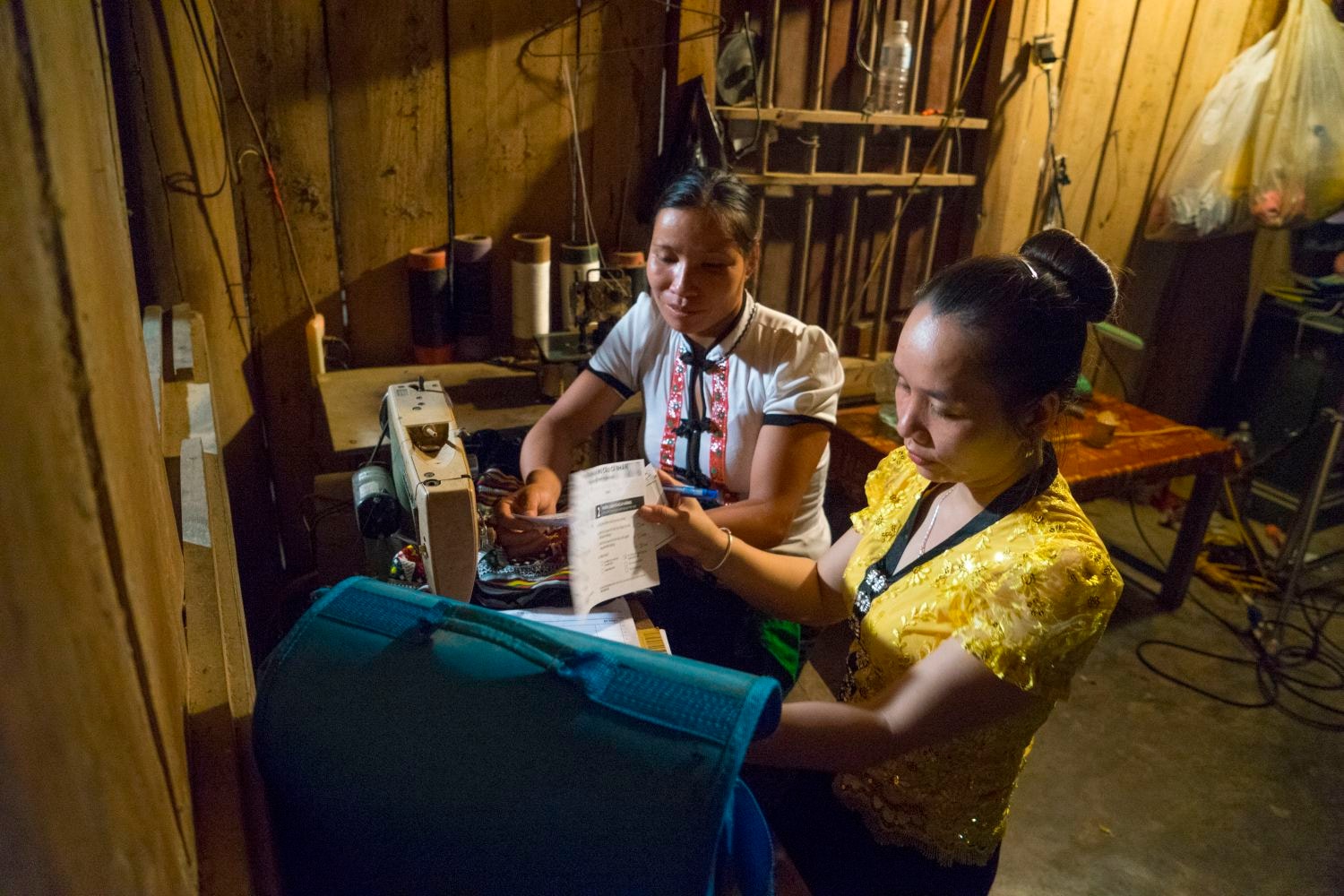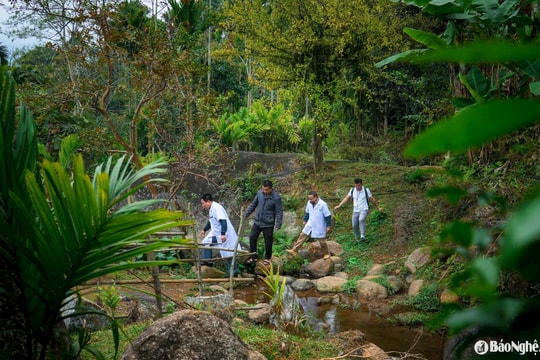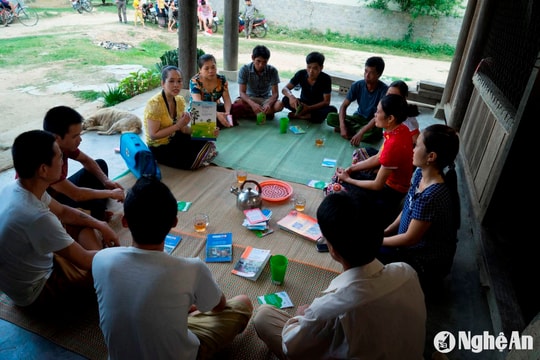Stories from the "AIDS epidemic" hotspot in the highlands of Nghe An
(Baonghean) - The situation of patients abandoning treatment; the decrease in counseling and testing activities; the complicated development of drug abuse... These are the difficulties in the "hot spot" of the AIDS epidemic in Que Phong.
Many people abandon treatment.
At Que Phong District Medical Center, Ms. LTH came to the examination and received ARV drugs with her bags in hand. H is fair-skinned and pretty; if she were seen anywhere else, no one would think she was an HIV patient.
Ms. H bitterly told her life story: “My house is in Tien Phong commune (the locality with the most patients in the district). My husband died of AIDS. Luckily, my 7-year-old son did not have it. Unable to survive in the countryside, I sent my son to his grandmother and went to Hanoi to earn a living. Every 1-2 months, I come back to get medicine for treatment. Recently, I have not been able to come back to get medicine on schedule because partly because of the difficulty of my job; partly because I have just met and lived as husband and wife with another person. If I come back often, I am afraid he will know that I have the disease.” Question: Do you use protection when having sex? - Ms. LTH sadly shook her head...
 |
| Examination, consultation, and medication for HIV patients at Que Phong Medical Center. Photo: Duc Anh |
In Que Phong district, not only Ms. LT H had to regularly stop taking ARV treatment because she had to go far away to work. For the sake of making a living, many people have "drifted" and were forced to forget that they were sick. According to statistics from the District Health Center: Since the first HIV case was discovered in November 1999, the total number of people infected in the district has reached 1,907. 794 people have died. Of the 1,113 patients still alive, 167 have gone far away to work and moved elsewhere.
People who work far away and move to other places cannot return to their hometown to receive medication regularly, so they gradually stop taking treatment... The district health center cannot know whether these patients have registered for ARV treatment at their new place of residence or not? And it is very possible that these people will become new sources of infection.
In Que Phong, it is not only people who work far away who skip treatment. There are currently 66 patients in the area who do not regularly come to the Health Center to receive medicine or do not participate in treatment.
Mrs. HTL, 70 years old, in Chau Kim commune (grandmother of 5-year-old M - HIV patient) said: Both of her parents died of AIDS, leaving her to her grandparents to raise. Now, her grandparents are very old and weak, so every time they go to get medicine for her is a difficult time. At old age, they only look to their children and grandchildren, looking to their children and grandchildren to find joy. But now looking at M makes me very sad... not knowing how many more days or months she has left to live.
Mr. LVD, in Dong Van commune, is only in his 30s but he looks like he has passed the other side of life. LVD lies on the tattered bamboo floor, exposing his dark skin and emaciated body, only bones, and gasps: “I am not an addict, but 6 years ago I went drinking with my friends. When I was drunk, my friends provoked me and invited me to inject heroin to get high. My pride was so high that I eventually got sick. Now, my health is weak and I can’t do anything. My wife takes care of the house and children. If I want to go to the district to get medicine, I don’t have a motorbike and no money. Before, the project program supported the cost of transportation, but now it doesn’t anymore... I just live as long as I can.”
For HIV/AIDS patients who quit ARV treatment in Que Phong, each person has a “legitimate” reason: the distance from the homes of infected and high-risk people to treatment facilities is very far. The patients are all economically disadvantaged and lack transportation, so they gradually quit treatment. And also due to difficult family economic conditions, many infected people have left their hometowns to work far away, not being present in the locality to receive care services.
But according to Mr. Sam Van Lam - Secretary of the HIV/AIDS Prevention Program of Que Phong District: The real reason for abandoning treatment is probably only known to them. Many people make excuses about poor health, lack of time, and lack of means, but even if the medicine is delivered to the commune health station, they still do not come to get it; even when propaganda is carried out, they hide and do not meet. For example, the Methadone program has 2 satellite drug distribution points in Chau Thon and Dong Van or the Needle and Condom Program has been deployed in all 14/14 communes and towns, but infected and sick people still do not come to get it or use it.
High risk of new infectionsIn addition to the situation of abandoning treatment, HIV/AIDS prevention work in Que Phong is currently facing many other difficulties. The number of infected people is only the “tip of the iceberg” because not all suspected people go to medical facilities to be tested and get treatment. These are people in remote areas, afraid to reveal their disease status.
 |
| Access to HIV/AIDS prevention propaganda for high-risk groups in remote areas. Photo courtesy |
Every year, through counseling and testing activities, the “hidden part” of the iceberg is constantly revealed: In 2015, Que Phong provided counseling and HIV testing for 2,163 cases, of which 242 were positive. In 2016, it tested 2,182 cases, of which 382 were positive. In 2017, it tested 1,550 cases, of which 189 were positive. From January to October 31, 2018, it tested 1,049 cases, of which 106 were positive.
The above figures also show another reality, which is that counseling and testing activities have decreased. The reason is that the above HIV/AIDS prevention and control support programs have been withdrawn; the budget for HIV/AIDS prevention and control activities has decreased, leading to HIV testing activities not being widespread, and media coverage has also decreased. Currently, in Que Phong, there is only one Global Fund project that directly supports the costs of mobile testing, testing for pregnant women, and viral load testing for patients....
HIV testing is becoming increasingly difficult, and the positive rate is low because the funding for specialists and collaborators in HIV/AIDS prevention has been depleted for the past three years. Without funding, more than 10 village health workers in key communes such as Tien Phong, Que Son, and Muong Noc have quit or changed jobs. The quality of HIV/AIDS prevention activities at the grassroots level has also decreased.
Meanwhile, the regime for these people under the Health - Population Target Program was approved slowly, making it difficult to re-establish and set up a network of outreach staff, not ready to go into operation.
In addition to the above difficulties, it must be said that the situation of drug trafficking and use in Que Phong is still complicated. Of the 508 addicts with records managed by the district, only 78 people participate in Methadone treatment. The reason for the low number of people undergoing treatment and decreasing is because some patients, after taking Methadone, secretly go home to use drugs; a few recover their health so they write a request to leave the program and go to work elsewhere.
Mr. Sam Van Lam warned: Que Phong is still experiencing a "undercurrent" of increased risk of new infections. When the transmission route through injection is controlled, the transmission route through sexual intercourse has emerged. The situation of using crystal meth and having promiscuous sex without using condoms is quite alarming.
In order for the "hot spot" Que Phong to better implement HIV/AIDS prevention, Mr. Le Quang Trung - Deputy Director of Que Phong Medical Center suggested: Nghe An Department of Health and provincial authorities should soon provide direction and assistance to the district level before taking over HIV/AIDS prevention from the projects that have stopped funding and handing it over to the locality. The province should consider providing additional allowances for the team of collaborators participating in HIV/AIDS prevention, which are village health workers. In addition to providing additional funding to organize communication campaigns, mobile testing and free treatment in remote villages, the province should increase staff to help the grassroots./.

.jpg)


.jpg)
![[Infographics] Biện pháp phòng tránh lây nhiễm HIV/AIDS [Infographics] Biện pháp phòng tránh lây nhiễm HIV/AIDS](https://bna.1cdn.vn/thumbs/540x360/2024/11/29/2-thuoc-hiv-shutterstock-436.jpg)
![[Infographics] Các hoạt động hưởng ứng Tháng hành động quốc gia phòng, chống HIV/AIDS năm 2024 tại Nghệ An [Infographics] Các hoạt động hưởng ứng Tháng hành động quốc gia phòng, chống HIV/AIDS năm 2024 tại Nghệ An](https://bna.1cdn.vn/thumbs/540x360/2024/11/26/i-17304602683291485293338.jpg)

